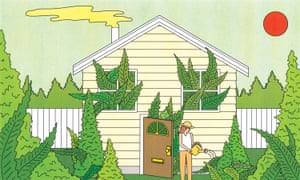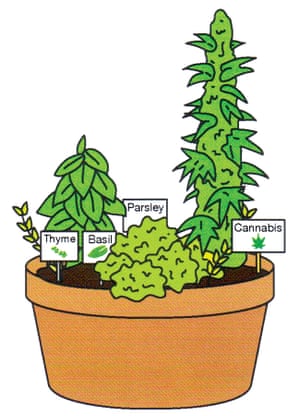Source: theguardian.com

‘There’s an empowerment that comes from being able to do it yourself.’
Illustration: George Wylesol
As legalization spreads, more people are interested in home growing. While it might not be rocket science, it does involve some knowhow
he Canadian government, which is likely to legalize cannabisnationwide this summer, said it planned to allow home grows of up to four marijuana plants, which might yield 5lb in a year to an experienced grower, and is certainly consumable by an experienced smoker.
In response, the Canadian Real Estate Association hit the panic button and called for a nationwide moratorium on home growing until it can be better studied. The group says home grows could deplete property values, and also raise rents, especially for low-income tenants. Supporters of the law say four plant grows pose minimal risk.
As legalization spreads, more cannabis enthusiasts are naturally going to want to try cultivation for themselves. The 2018 National Gardening Survey found 15% of US households would grow marijuana at home if it was legal. But, along with edibles, home growing is generally among the most contentious topics within the legalization debate.
Allowing it, police say, enables criminals to hide in plain sight. For law-abiding growers it could invite burglaries, since their stash is worth $1,000 a pound and easy to resell. Firefighters worry about the blazing hot lightbulbs growers use and their elaborate electrical set-ups.
The plants can attract unappetizing blights like spider mites, fungus gnats, powdery mildew and grey mold, also called bud rot. And the odor can annoy neighbors. The most vocal opponents of home growing may be the Quebec government which has said it will not allow home grow immediately, as part of an effort to legalize at its own pace.
But home growing has its pleasures. Like tomatoes or carrots, growing one’s own cannabis is cheaper than buying it, and a chance to learn something.
“There’s an empowerment that comes from being able to do it yourself,” said Nichole Graf, who left New York City with her partner in 2013 to start a marijuana farm in Washington state. Growing, she said, would also be useful if the administration went after the industry and pushed the drug back to the illegal market. With her business partners, she co-authored Grow Your Own: Understanding, cultivating and enjoying cannabis, a nicely illustrated and eco-minded introduction.
“It’s not rocket science,” she said, but it does involve some knowhow.

How to grow your own weed
Cannabis is a sexed plant; the drug is the flower from the female. The hard to detect presence of a male plant can ruin the flower produced by a whole room of females. To avoid pollination, large-scale marijuana grows typically use clones instead of seeds, and Graf recommends novice growers to begin with clones as well. The wrong lighting can also be ruinous for a very expensive crop.
For the home grower, this matters much less, and Graf says it helps someone develop their appreciation for the plant. Amid rising interest in home grows, companies have developed home grow pods controlled by smartphone apps and other more modest growing kits and accessories. With strong weed no longer hard to find, home growing is a chance for connoisseurs to grow for CBD, a chemical commonly associated with the plant’s medicinal properties, or for a plant’s terpene profile (bouquet).
Marijuana growing can be relatively straightforward or “as complicated as you want to make it”, Graf said. Like so many aspects of cannabis, this is a culture advanced largely by solitary men, deeply invested in their competitive world.
Conversations about variation in soil substitutes, light spectra and humidity are frequent and achieve Warholian feats of boredom. They’re also potentially very important. As a high-value crop, cannabis may attract investment into lighting, water management and other agricultural technologies that might go ignored when the crop is $2 heads of lettuce. These new technologies are environmentally friendly and potentially earth-shattering politically, since they could transfer agriculture to cities.
That’s probably a few years off though.
For now, one place which has accepted home grow is Vermont. Of the nine US states which have fully legalized, Vermont is the only one not to allow a commercial industry. Instead, the state will allow possession and home growing, up to six plants, including two flowered females.
Marijuana won’t be anything new to Vermont; it is, after all, the state that gave the world Ben & Jerry’s Ice Cream and the jam band Phish. But the opioid-ravaged state sought to create a buffer between itself and a new for-profit intoxicant, instead making it legal but not readily available. It’s practically un-American to postpone commerce for the sake of the public good, another reason why Vermont’s experiment with growing your own is worth watching.
No comments:
Post a Comment